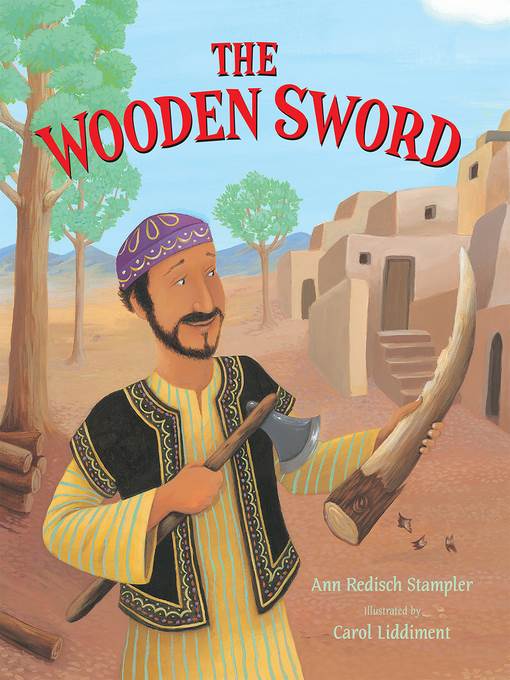
The Wooden Sword
A Jewish Folktale from Afghanistan
فرمت کتاب
ebook
تاریخ انتشار
2012
Reading Level
3
ATOS
4.6
Interest Level
K-3(LG)
نویسنده
Carol Liddimentشابک
9780807592038
کتاب های مرتبط
- اطلاعات
- نقد و بررسی
- دیدگاه کاربران
نقد و بررسی

February 1, 2012
K-Gr 2-A shah decides to test a Jewish shoemaker's faith in God by outlawing each of the jobs he assumes, from shoemaker to water seller to woodcutter. The poor man eventually becomes a member of the royal guard, but can afford only a wooden sword. However, when he is told to behead a thief, he finds an ingenious way out of his predicament. The Afghani setting is reflected through the warm, earth tones and through the intricate patterns on rugs, clothing, and wall hangings in the background of the richly painted spreads. Despite the man's hardships, the simple yet elegant prose reinforces his optimistic refrain that "everything turns out just as it should." The lush, detailed backgrounds of the spreads bring to life the various settings, such as the marketplace where the man mends shoes and the shah's palace. Religious devotion is a theme throughout the story, but readers will be most drawn to the protagonist's cleverness rather than his piety. As a comprehensive author's note explains, the clothing and cultural traditions of the characters are historically accurate. Ideal for those looking to add ethnic diversity to their folktale collections.-Mahnaz Dar, formerly at Convent of the Sacred Heart, New York City
Copyright 2012 School Library Journal, LLC Used with permission.

December 15, 2011
An old Jewish folktale set in Afghanistan tests the faith and character of both a wealthy shah and a poor man. In old Kabul, the good shah leaves his lavish home disguised as a servant to discover whether the people of his country are "sad or happy, rich or poor, foolish or wise." In the poorest part of town, he encounters a young Jewish couple happily welcoming the Sabbath. Impressed with their attitude despite their humble circumstances, the shah questions the man's livelihood and decides to secretly challenge his never-failing faith by creating a series of decrees that will hamper the man's ability to earn "puli," or money. Each time, though, the former shoemaker succeeds in finding new work as a water carrier, woodcutter and royal guard. When, as a guard, the young Jew is made royal executioner and must cut off the head of a thief, both faith and wit save the day, and the shah finally understands the Jew's true ability to wisely carve out his path in life. Detailed, gently humorous paintings reflect the colorful richness of the Afghani traditional rugs, robes and turbans set against sandy mountainous backdrops. This tale of perseverance and confidence is told with well-researched authenticity and offers a positive view of this war-torn nation. (author's note) (Folktale. 5-8)
(COPYRIGHT (2011) KIRKUS REVIEWS/NIELSEN BUSINESS MEDIA, INC. ALL RIGHTS RESERVED.)

March 15, 2012
Grades K-3 In a break from the usual folktale archetypes of the cruel ruler who bullies a poor rebel, both the Muslim shah and the Jewish shoemaker in this tale are happy and good. Disguised as a servant, the shah walks through the streets of Kabul to find out how his poor people live. Curious about why the shoemaker is so happy, the ruler passes a law that no one can repair shoes in the street. Unperturbed, the shoemaker becomes a water carrier, and when that is forbidden, he cuts wood. His wife worries, but the man continuously feels blessed, his faith unshaken. In a tense climax, the shah makes the poor man a royal guard with a sharp sword, but when the shoemaker refuses to use the weapon, the shah brings the poor man to the palace and makes him a royal adviser. With the dramatic standoffs, readers will enjoy the uncluttered, double-page spreads and bright, detailed collage images that show the contrasts between palace and street. A long author's note fills in some history of the Jews in Afghanistan.(Reprinted with permission of Booklist, copyright 2012, American Library Association.)

























دیدگاه کاربران